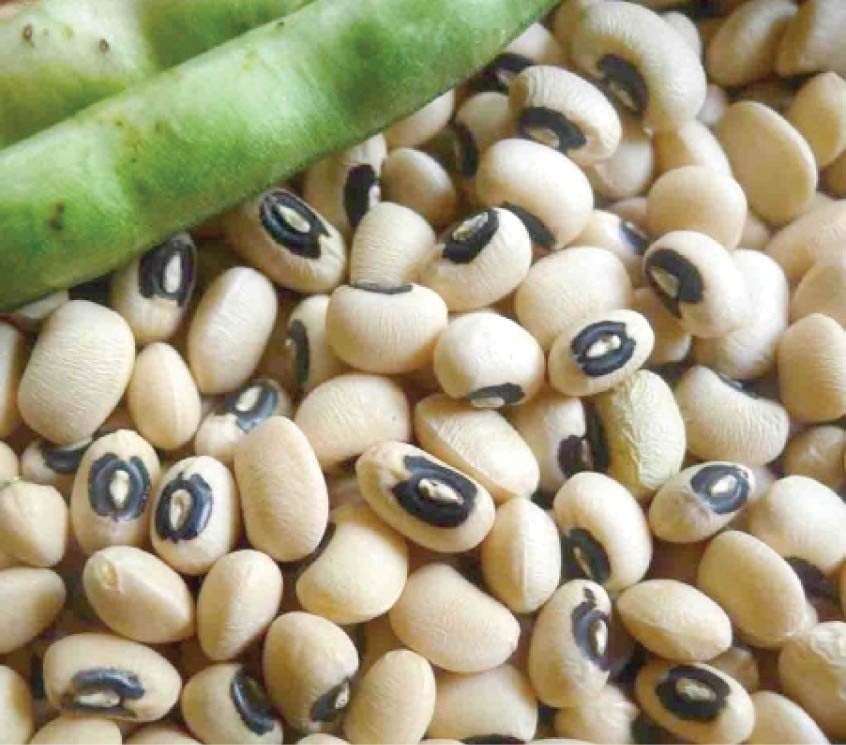Experts have encouraged cowpea (beans) farmers to adhere strictly to best practices in order to achieve a successful outcome as they begin planting preparation in their fields.
Many farmers in the producing states, especially Benue, are becoming interested in cowpea cultivation, especially with the recent availability of improved quality varieties.
Inside Nigeria’s harmful traditional practices that impede women’s rights to land ownership
Cashew farmers in Kogi lament challenges despite economic benefits
The Benue State chairman of the All Farmers Association of Nigeria (AFAN), Comrade Aondongu Saaku, said at least 500 registered farmers are currently producing cowpea in the state.
He identified the high cost of cowpea in the market and cost of production as the reasons more farmers were delving into the cultivation of the crop, saying that for a long period, it has become out of reach for low-income earners.
“The simple reason is that money is not coming from anywhere, so people don’t even have the money to buy the commodity. The price of the commodity is another thing entirely, and that’s why more people are now planting the crop so that they won’t go to the market and look for it.
“Secondly, inorganic production is subjecting people to a lot of suffering. And they have become aware, through sensitisation, that inorganic production is suffering, even as it is not crossing our borders. So people are now growing it (cowpea) organically so as to have it as food.
“This reason has actually doubled the number of people cultivating cowpea in the state. I am yet to get updated data from the cowpea association in the state, but no fewer than 500 registered farmers are cultivating the crop now.
“We are encouraging the farmers to go into massive cultivation of cowpea since organic fertiliser is even cheaper than the inorganic type so that it will benefit them. The actual time of planting is between August and September. There are varieties that could take up to three months and people are already clearing the fields now for those ones,” Saaku said.
Best practices farmers should adopt –Researcher
A professor of Plant Breeding and Genetics at Joseph Sarwuan Tarka University, formerly called the Federal University of Agriculture, Makurdi (FUAM), Lucky Omoigui, has outlined the best practices cowpea farmers can imbibe to ensure bountiful harvest this year.
Omoigui said because Benue State fell under dry savannah, rainfall would be a bit higher; therefore, the normal planting timing for its cowpea production should be in August, between 17 and 20.
“That time is very good. Some people use the advantage of early maturing variety of cowpea developed by the FUAM so that they can harvest twice in a season, while some people who have already planted in May are to harvest between July and August. Some are harvesting now, and that’s the good thing about FUAMPEA 1. They will plant again by August 20 and even 25 for the early one, and the late maturing one from August 20, like FUAMPEA 3 and 4,” he said.
The university don, however, advised cowpea farmers to, by all means, acquire good seeds instead of grains for planting so that they can achieve great harvest and better income.
“But they have to source their seeds from a recognised seed company and not just going to the market to buy grains. They should buy improved variety quality seeds from certified places. There are so many seeds company now that are selling good quality varieties. They can also go the University of Agriculture, Makurdi to source information on where those companies are spread. Buying from seed companies will guarantee genetic purity and viability.
“The farmers already know what varieties they need, like FUAMPEA 1 and 14, as well as, FUMPEA 2, 3 and 4 (brown), which are already available in Makurdi. They are all improved varieties.
“When they plant, they must be able to spray with good insecticides, at least a minimum of three sprayings, except when they observe defect at the beginning of the season. They must be able to spray with the right chemicals. I think the seed company or the University of Agriculture, Makurdi, has all the good chemicals that would be able to protect their crops. The major challenge is pest management.
“Also, because of soil-burn diseases they can dress their seeds before they plant. Weed management is also very important; those are the ones which attract insects, and they compete with the crops. The good thing now for large-scale farmers is that they have what they call selective herbicides.
“Once you do good land preparation, you spray with lamposite that lasts for 10 days before you prepare your land, then you prepare land harrow and range and plant. You don’t need to apply herbicides or its likes; you just leave it for three weeks, then spray the selective herbicides. It is pest-resistant and it can take it up to maturity. You don’t even need to weed again. That selective chemical for cowpea is called Raptor. It has to be applied three weeks after planting. And the time of planting is very important,” he emphasised.
Omoigui further maintained that when farmers plant for early maturity, it should be between August 20 and 28, while the late maturing ones would be between August 20 and 23. He noted that as farmers harvest manually for now, they should ensure that the cowpea pod has turned strigable, dried, and the moisture content very low, at least 12 per cent before it is harvested.
He added, “And for post-harvest technology, we don’t encourage the use of chemicals for storage. Make sure you harvest the seeds at the appropriate time so that it would not deteriorate in the field before harvesting because most of the weevils that affect cowpea are from field to store. So, harvest at the right time, sun- dry it and the moisture content, about 12 per cent before you store it in a leather bag. That gives you a perfect storage.
Before the release of FUMPEAs, Benue farmers hardly cultivated cowpea in commercial quantities because the old variety available to them was susceptible to weevils, non-drought resistance and non-high yielding, among other disadvantages.
Presently, however, many farmers have switched interest to cultivating the crop, not just for income generation in commercial quantities but for its nutrient value for their families.
This development followed the 2016 release of FUMPEA 1 and 2 by the FUAM, in collaboration with the International Institute of Tropical Agriculture (IITA).
The FUMPEAs are improved cowpea seed varieties which enable farmers to produce brown or white cowpea with sweeter taste. Other new hybrid and early maturing varieties are also available to farmers in the state, as well as those within the North Central region to grow for commercial purposes.
Some experts in cowpea breeding in the university, including Prof Omoigui, opined that the varieties of improved cowpea seeds churned out of the institution were based on farmers’ choices. For VitalisTarnongu, a big cowpea farmer, whose company, Teryima Nigeria Limited, in Makurdi, has been approved for seed production by the National Agricultural Seeds Council, there are available high yielding cowpea seed varieties in stock for interested farmers.
The available seeds in commercial quantities to farmers are FUAMPEA 1 and 2.
Tarnongu said he already planned to cultivate cowpea on a 15-hectare field this season and would begin planting on August 15, which is the peak period.
He advised farmers to spray their land and begin planting 15 days afterward, stressing the need for them to engage in purely organic production.
He expressed delight that the seeds were resistant to drought and striga, stressing, that the seeds do well on Benue soil but not on swampy areas, even as land preparation remained the best agronomy practice for the various new varieties.
Tarnongu also maintained the need for farms to be weed-free to enable high yield, adding that the seeds have the ability of a three-year lifespan, and that though he grows it twice (two planting seasons) consecutively on his field, the seed could effectively evolve a three-year maximal lifespan.
Also, a seed systems principal investigator in the FUAM, Dr Teryima Iorlamen, encouraged farmers to obtain their seeds from reputable sources, such as the university outlets, where FUMPEA 1 and 2 and SAMPEA 14 and 15 are available presently.
He said farmers did not have to worry endlessly about weeding any longer following the recent breakthrough of a weeding chemical known as Raptor, adding, however, that the IITA already demonstrated the use of a post-harvest chemical used within 14 and 21 days, after planting.
The seed system expert advised farmers who plant the improved seed to begin harvesting when pods turn yellow, and they should dry, thresh the produce on clean platform and store in recommended bags, which can be obtained from the university.
Iorlamen also said the new seeds may be planted for more than one season, and mentioned the necessity to test germination percentage.
The principal investigator advised farmers to plant cowpea on well drained flat soils, not water lodged, emphasising best agronomic practices to include site selection, choice of improved varieties with high yield and resistance to biotic and abiotic stresses.
He harped on good land preparation, planting at recommended spacing and time, as well as the use of 20-25 kg/ha weeding, fertiliser application, use of SSP fertiliser at planting, insect pest control at flowers initiation and flowering, podding with repeat spraying after one week (seven days interval) to achieve a desirable result.
“The seeds are resistant to striga, drought, alectra. We don’t encourage farmers to buy the seeds from the open market because they may be mixed. Farmers should obtain their seeds only from recommended companies or research institutions,” the seed systems expert advised.

 Join Daily Trust WhatsApp Community For Quick Access To News and Happenings Around You.
Join Daily Trust WhatsApp Community For Quick Access To News and Happenings Around You.


